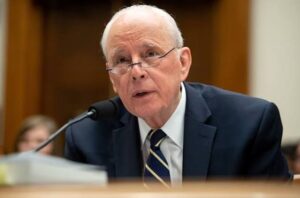Watergate Veteran John Dean: Today’s Threats to Democracy

The threat of powerism for democracy with John Dean. Gen Rubin’s Green Room. Today we will discuss about Watergate Veteran John Dean: Today’s Threats to Democracy
Watergate Veteran John Dean: Today’s Threats to Democracy
John Dean, the former White House Counsel during President Richard Nixon’s administration, became a pivotal figure in American political history. His testimony before the Senate Watergate Committee in 1973 exposed the depth of the Nixon administration’s misconduct, leading to the eventual resignation of President Nixon. Decades later, Dean’s insights continue to resonate, offering a lens through which we can examine the evolving challenges to democratic institutions. In this article, we delve into Dean’s reflections on past and present threats to democracy, drawing parallels between the Watergate scandal and contemporary political events.
The Watergate Scandal: A Prelude to Accountability

The Watergate scandal, a defining moment in American political history, centered around a break-in at the Democratic National Committee headquarters during the 1972 presidential campaign. The subsequent cover-up efforts by the Nixon administration led to widespread investigations and hearings. John Dean’s testimony before the Senate Watergate Committee was instrumental in uncovering the truth. He described the administration’s actions as a “devastating mosaic of intrigue, illegality and abuse of power,” highlighting the systemic nature of the wrongdoing.
Dean’s decision to testify, despite the personal and professional risks, underscored the importance of accountability in preserving democratic institutions. His testimony not only implicated high-ranking officials but also set a precedent for the role of legal counsel in upholding the law, even when it conflicts with executive power.
From Watergate to Contemporary Concerns
In the years following Watergate, John Dean remained an active commentator on political affairs, often drawing parallels between past and present challenges to democracy. His 2006 book, Conservatives Without Conscience, co-authored with psychologist Bob Altemeyer, explored the rise of authoritarian tendencies within political movements, particularly focusing on the Republican Party. Dean argued that the party had increasingly embraced authoritarian ideologies, undermining democratic norms and institutions.
Dean’s concerns were further amplified during the presidency of Donald Trump. He identified several actions and behaviors that echoed the authoritarian practices he had witnessed during the Nixon era. In a 2019 testimony before the House Judiciary Committee, Dean highlighted “remarkable parallels” between the Watergate scandal and the findings of Special Counsel Robert Mueller’s investigation into Russian interference in the 2016 election. He noted similarities in the obstruction of justice and the manipulation of legal processes.
The Erosion of Democratic Norms
One of Dean’s primary concerns is the gradual erosion of democratic norms. He observes that actions once considered egregious violations of democratic principles have become normalized over time. For instance, the use of executive power to suppress dissent, undermine the judiciary, and attack the free press were hallmark tactics of the Nixon administration. Dean notes that similar strategies have been employed in recent years, often with little public outcry.
Dean also emphasizes the role of political polarization in weakening democratic institutions. He argues that as political divisions deepen, the willingness to uphold democratic norms diminishes. Partisanship can lead individuals to overlook or justify undemocratic actions if they align with their political affiliations, thereby compromising the integrity of democratic systems.
The Role of Legal Institutions
Throughout his career, John Dean has underscored the critical role of legal institutions in safeguarding democracy. During the Watergate hearings, the judiciary’s willingness to investigate and hold the executive accountable was pivotal in restoring public trust. Dean asserts that a robust and independent legal system is essential for maintaining the checks and balances that prevent the concentration of power.
In recent years, Dean has expressed concern over attempts to undermine the judiciary’s independence. He points to efforts to politicize judicial appointments and challenge the legitimacy of court decisions as threats to the foundational principles of democracy. Dean advocates for the preservation of judicial independence and the reinforcement of legal norms to ensure that democratic institutions remain resilient.
The Importance of Civic Engagement
John Dean believes that an informed and engaged citizenry is vital for the preservation of democracy. He encourages individuals to actively participate in the democratic process, whether through voting, civic education, or holding public officials accountable. Dean warns that complacency and disengagement can lead to the erosion of democratic values, as unchecked power can flourish in the absence of public scrutiny.
Dean also highlights the importance of media literacy in the digital age. With the proliferation of misinformation and disinformation, he stresses the need for citizens to critically evaluate sources of information and resist narratives that seek to divide and manipulate. An informed electorate is better equipped to make decisions that reflect democratic principles and to challenge attempts to subvert democratic norms.
Conclusion
John Dean’s experiences during the Watergate scandal and his subsequent reflections provide invaluable insights into the vulnerabilities of democratic systems. His observations serve as a cautionary tale, reminding us that democracy requires constant vigilance and active participation. As we face contemporary challenges to democratic institutions, Dean’s call to uphold accountability, protect legal institutions, and engage civically remains as relevant as ever. By learning from the past and remaining steadfast in our commitment to democratic values, we can work to ensure that the lessons of Watergate continue to guide us toward a more just and resilient democracy.
How useful was this post?
Click on a star to rate it!
Average rating 0 / 5. Vote count: 0
No votes so far! Be the first to rate this post.
About the Author
usa5911.com
Administrator
Hi, I’m Gurdeep Singh, a professional content writer from India with over 3 years of experience in the field. I specialize in covering U.S. politics, delivering timely and engaging content tailored specifically for an American audience. Along with my dedicated team, we track and report on all the latest political trends, news, and in-depth analysis shaping the United States today. Our goal is to provide clear, factual, and compelling content that keeps readers informed and engaged with the ever-changing political landscape.




